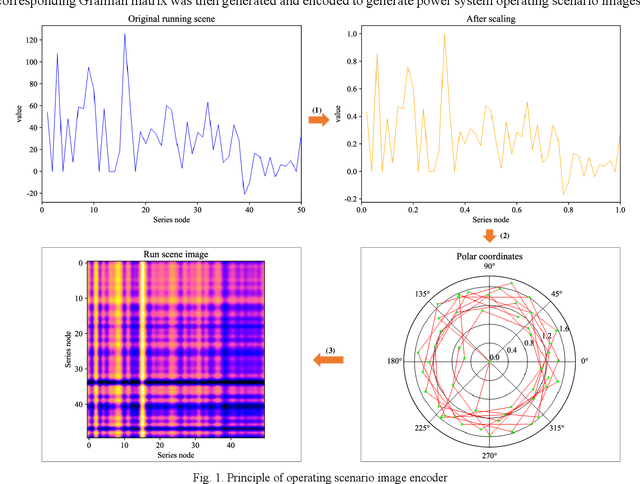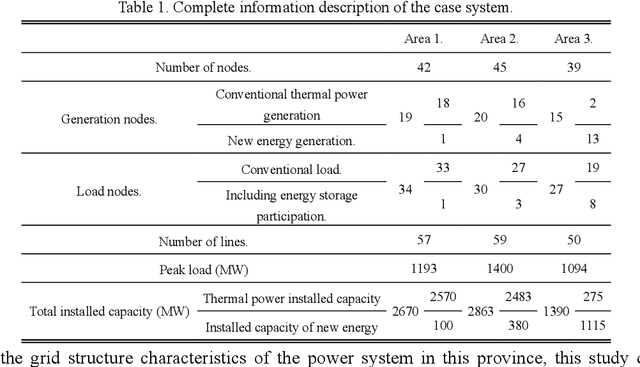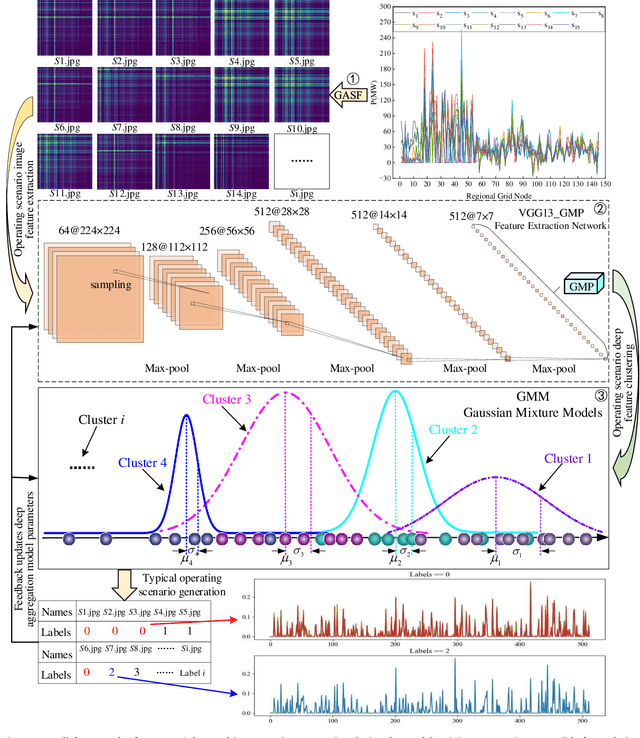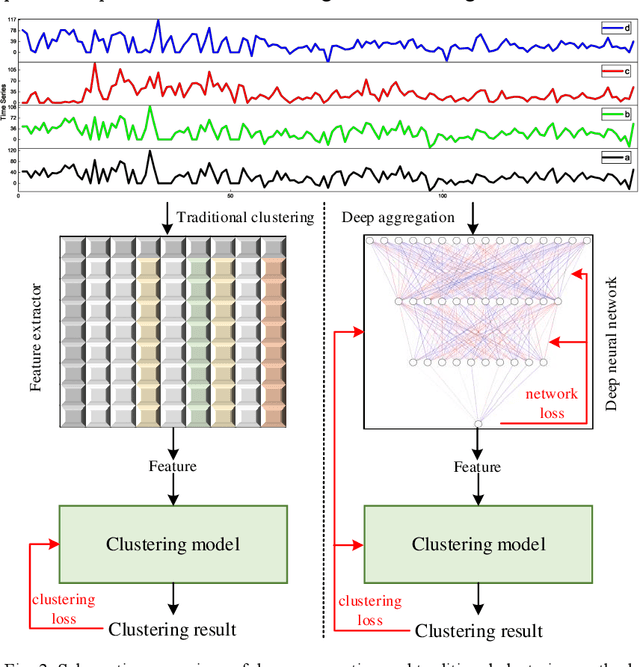Chao Long
Extraction of Typical Operating Scenarios of New Power System Based on Deep Time Series Aggregation
Aug 23, 2024



Abstract:Extracting typical operational scenarios is essential for making flexible decisions in the dispatch of a new power system. This study proposed a novel deep time series aggregation scheme (DTSAs) to generate typical operational scenarios, considering the large amount of historical operational snapshot data. Specifically, DTSAs analyze the intrinsic mechanisms of different scheduling operational scenario switching to mathematically represent typical operational scenarios. A gramian angular summation field (GASF) based operational scenario image encoder was designed to convert operational scenario sequences into high-dimensional spaces. This enables DTSAs to fully capture the spatiotemporal characteristics of new power systems using deep feature iterative aggregation models. The encoder also facilitates the generation of typical operational scenarios that conform to historical data distributions while ensuring the integrity of grid operational snapshots. Case studies demonstrate that the proposed method extracted new fine-grained power system dispatch schemes and outperformed the latest high-dimensional featurescreening methods. In addition, experiments with different new energy access ratios were conducted to verify the robustness of the proposed method. DTSAs enables dispatchers to master the operation experience of the power system in advance, and actively respond to the dynamic changes of the operation scenarios under the high access rate of new energy.
AvatarVerse: High-quality & Stable 3D Avatar Creation from Text and Pose
Aug 07, 2023



Abstract:Creating expressive, diverse and high-quality 3D avatars from highly customized text descriptions and pose guidance is a challenging task, due to the intricacy of modeling and texturing in 3D that ensure details and various styles (realistic, fictional, etc). We present AvatarVerse, a stable pipeline for generating expressive high-quality 3D avatars from nothing but text descriptions and pose guidance. In specific, we introduce a 2D diffusion model conditioned on DensePose signal to establish 3D pose control of avatars through 2D images, which enhances view consistency from partially observed scenarios. It addresses the infamous Janus Problem and significantly stablizes the generation process. Moreover, we propose a progressive high-resolution 3D synthesis strategy, which obtains substantial improvement over the quality of the created 3D avatars. To this end, the proposed AvatarVerse pipeline achieves zero-shot 3D modeling of 3D avatars that are not only more expressive, but also in higher quality and fidelity than previous works. Rigorous qualitative evaluations and user studies showcase AvatarVerse's superiority in synthesizing high-fidelity 3D avatars, leading to a new standard in high-quality and stable 3D avatar creation. Our project page is: https://avatarverse3d.github.io
Data-Driven Distributionally Robust Scheduling of Community Integrated Energy Systems with Uncertain Renewable Generations Considering Integrated Demand Response
Jan 28, 2023



Abstract:A community integrated energy system (CIES) is an important carrier of the energy internet and smart city in geographical and functional terms. Its emergence provides a new solution to the problems of energy utilization and environmental pollution. To coordinate the integrated demand response and uncertainty of renewable energy generation (RGs), a data-driven two-stage distributionally robust optimization (DRO) model is constructed. A comprehensive norm consisting of the 1-norm and infinity-norm is used as the uncertainty probability distribution information set, thereby avoiding complex probability density information. To address multiple uncertainties of RGs, a generative adversarial network based on the Wasserstein distance with gradient penalty is proposed to generate RG scenarios, which has wide applicability. To further tap the potential of the demand response, we take into account the ambiguity of human thermal comfort and the thermal inertia of buildings. Thus, an integrated demand response mechanism is developed that effectively promotes the consumption of renewable energy. The proposed method is simulated in an actual CIES in North China. In comparison with traditional stochastic programming and robust optimization, it is verified that the proposed DRO model properly balances the relationship between economical operation and robustness while exhibiting stronger adaptability. Furthermore, our approach outperforms other commonly used DRO methods with better operational economy, lower renewable power curtailment rate, and higher computational efficiency.
* Accepted by Applied Energy
Optimal scheduling of island integrated energy systems considering multi-uncertainties and hydrothermal simultaneous transmission: A deep reinforcement learning approach
Dec 27, 2022



Abstract:Multi-uncertainties from power sources and loads have brought significant challenges to the stable demand supply of various resources at islands. To address these challenges, a comprehensive scheduling framework is proposed by introducing a model-free deep reinforcement learning (DRL) approach based on modeling an island integrated energy system (IES). In response to the shortage of freshwater on islands, in addition to the introduction of seawater desalination systems, a transmission structure of "hydrothermal simultaneous transmission" (HST) is proposed. The essence of the IES scheduling problem is the optimal combination of each unit's output, which is a typical timing control problem and conforms to the Markov decision-making solution framework of deep reinforcement learning. Deep reinforcement learning adapts to various changes and timely adjusts strategies through the interaction of agents and the environment, avoiding complicated modeling and prediction of multi-uncertainties. The simulation results show that the proposed scheduling framework properly handles multi-uncertainties from power sources and loads, achieves a stable demand supply for various resources, and has better performance than other real-time scheduling methods, especially in terms of computational efficiency. In addition, the HST model constitutes an active exploration to improve the utilization efficiency of island freshwater.
* Accepted by Applied Energy
Wind Power Forecasting Considering Data Privacy Protection: A Federated Deep Reinforcement Learning Approach
Nov 02, 2022



Abstract:In a modern power system with an increasing proportion of renewable energy, wind power prediction is crucial to the arrangement of power grid dispatching plans due to the volatility of wind power. However, traditional centralized forecasting methods raise concerns regarding data privacy-preserving and data islands problem. To handle the data privacy and openness, we propose a forecasting scheme that combines federated learning and deep reinforcement learning (DRL) for ultra-short-term wind power forecasting, called federated deep reinforcement learning (FedDRL). Firstly, this paper uses the deep deterministic policy gradient (DDPG) algorithm as the basic forecasting model to improve prediction accuracy. Secondly, we integrate the DDPG forecasting model into the framework of federated learning. The designed FedDRL can obtain an accurate prediction model in a decentralized way by sharing model parameters instead of sharing private data which can avoid sensitive privacy issues. The simulation results show that the proposed FedDRL outperforms the traditional prediction methods in terms of forecasting accuracy. More importantly, while ensuring the forecasting performance, FedDRL can effectively protect the data privacy and relieve the communication pressure compared with the traditional centralized forecasting method. In addition, a simulation with different federated learning parameters is conducted to confirm the robustness of the proposed scheme.
 Add to Chrome
Add to Chrome Add to Firefox
Add to Firefox Add to Edge
Add to Edge